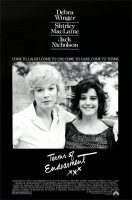Taglines: Come to laugh, come to cry, come to care, come to terms.
Terms of Endearment movie storyline. Aurora and Emma are mother and daughter who march to different drummers. Beginning with Emma’s marriage, Aurora shows how difficult and loving she can be. The movie covers several years of their lives as each finds different reasons to go on living and find joy. Aurora’s interludes with Garrett Breedlove, retired astronaut and next door neighbor are quite striking. In the end, different people show their love in very different ways.
Terms of Endearment is a 1983 American comedy-drama film adapted from the novel of the same name by Larry McMurtry, directed, written, and produced by James L. Brooks and starring Shirley MacLaine, Debra Winger, Jack Nicholson, Danny DeVito, Jeff Daniels, and John Lithgow. The film covers 30 years of the relationship between Aurora Greenway (MacLaine) and her daughter Emma (Winger).
The film received eleven Academy Award nominations and won five. Brooks won the Academy Awards for Best Picture, Best Director, and Best Writing (Adapted Screenplay) while MacLaine won the Academy Award for Best Actress and Nicholson won the Academy Award for Best Supporting Actor. In addition, it won four Golden Globes: Best Motion Picture – Drama, Best Actress in a Drama (Shirley MacLaine), Best Supporting Actor (Nicholson), and Best Screenplay (James L. Brooks).
Review for Terms of Endearment
When families get together to remember their times together, the conversation has a way of moving easily from the tragedies to the funny things. You’ll mention someone who has passed away, and there’ll be a moment of silence, and then somebody will grin and be reminded of some goofy story. Life always has an unhappy ending, but you can have a lot of fun along the way, and everything doesn’t have to be dripping in deep significance.
The most remarkable achievement of “Terms of Endearment,” which is filled with great achievements, is its ability to find the balance between the funny and the sad, between moments of deep truth and other moments of high ridiculousness. A lesser movie would have had trouble moving between the extremes that are visited by this film, but because “Terms of Endearment” understands its characters and loves them, we never have a moment’s doubt: What happens next is supposed to happen. because life’s like that.
“Terms of Endearment” feels as much like life as any movie I can think of. At the same time, it’s a triumph of show business, with its high comic style, its flair for bittersweet melodrama and its star turns for the actors. Maybe the best thing about this movie is the way it combines those two different kinds of filmmaking. This is a movie with bold emotional scenes and big laughs, and at the same time it’s so firmly in control of its tone that we believe we are seeing real people.
The movie’s about two remarkable women and their relationships with each other and with the men in their lives. The mother is played by Shirley MacLaine. She’s a widow who lives in Houston and hasn’t dated a man since her husband died. Maybe she’s redirected her sexual desires into the backyard, where her garden has grown so large and elaborate that she either will have to find a man pretty quickly or move to a house with a bigger yard.
Her daughter, played by Debra Winger, is one of those people who seems to have been blessed with a sense of life and joy. She marries a guy named Flap who teaches English in a series of Midwestern colleges; she rears three kids and puts up with Flap, who has an eye for coeds.
Back in Houston, her mother finally goes out on a date with the swinging bachelor (Jack Nicholson) who has lived next door for years. He’s a hard-drinking, girl-chasing former astronaut with a grin that hints of unspeakable lusts. MacLaine, a lady who surrounds herself with frills and flowers, is appalled by this animalistic man and then touched by him.
There are a couple of other bittersweet relationships in the film. Both mother and daughter have timid, mild-mannered male admirers: MacLaine is followed everywhere by Vernon, who asks only to be allowed to gaze upon her, and Winger has a tender, little affair with a banker. The years pass. Children grow up into adolescence, Flap gets a job as head of the department in Nebraska, the astronaut turns out to have genuine human possibilities of becoming quasi-civilized, and mother and daughter grow into a warmer and deeper relationship. All of this is told in a series of perfectly written, acted and directed scenes that flow as effortlessly as a perfect day, and then something happens that is totally unexpected, and changes everything.
This is a wonderful film. There isn’t a thing that I would change, and I was exhilarated by the freedom it gives itself to move from the high comedy of Nicholson’s best moments to the acting of Debra Winger in the closing scenes. She outdoes herself. It’s a great performance. And yet it’s not a “performance.” There are scenes that have such a casual piety that acting seems to have nothing to do with it. She doesn’t reach for effects, and neither does the film, because it’s all right there.
Terms of Endearment (1983)
Directed by: James L. Brooks
Starring: Shirley MacLaine, Debra Winger, Jack Nicholson, Danny DeVito, Jeff Daniels, John Lithgow, Lisa Hart Carroll, Shane Serwin
Screenplay by: James L. Brooks
Production Design by: Polly Platt
Cinematography by: Andrzej Bartkowiak
Film Editing by: Richard Marks
Costume Design by: Kristi Zea
Set Decoration by: Anthony Mondell, Tom Pedigo
Art Direction by: Harold Michelson
Music by: Michael Gore
Distributed by: Paramount Pictures
Release Date: December 9, 1983
Visits: 56






